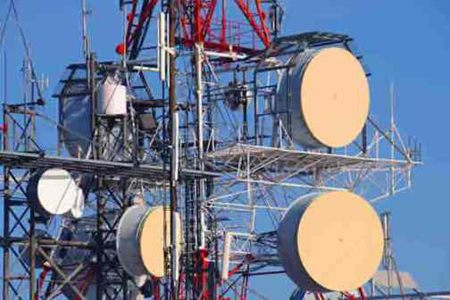Photo caption: Telecoms mast
Nigeria’s telecommunications sector experienced 33 major network outages in May, driven by a surge in vandalism, fibre-optic cable cuts, and persistent power shortages, according to data from Uptime, the Nigerian Communications Commission’s major outage reporting portal.
The report, obtained on Wednesday, showed that all four major operators – MTN, Airtel, Globacom, and 9mobile – suffered service disruptions during the month, with Globacom and 9mobile recording the highest number of incidents. The outages affected millions of subscribers, resulting in degraded service quality, dropped calls, and internet disruptions across several states.
According to the Uptime portal, the incidents were caused by a range of factors, including fibre cuts from road construction activities, equipment vandalism, power outages, and, in some cases, theft of telecom infrastructure. These challenges severely impacted telecom services in both urban and rural areas.
The third biggest operator, Globacom, reported 13 incidents in May, the highest among the operators, mainly due to fibre cuts and power issues in states such as Lagos, Rivers, Ogun, and the Federal Capital Territory. 9mobile followed with 11 incidents, primarily citing power failures and technical faults.
The biggest operators, MTN and Airtel, reported five and four incidents, respectively. MTN’s disruptions were traced to fibre damage in Benue, Imo, and Akwa Ibom states, while Airtel cited service interruptions in Bayelsa and Abia due to vandalism and power-related failures.
The financial toll is significant. According to Bloomberg, the telecom industry lost an estimated N27 bn in 2023 due to repairs and revenue losses linked to damaged fibre cables. Each outage in May 2025 is likely to have added millions of naira in additional costs.
Earlier this year, NCC Executive Vice Chairman Aminu Maida revealed that the sector had recorded over 50,000 fibre cuts in 2024 alone, with approximately 30,000 attributed to road construction by federal and state agencies. In 2023, Lagos alone accounted for over 2,500 fibre cuts, costing operators roughly N5 bn.
Telecom operators continue to express concern about the vulnerability of their infrastructure, especially in areas where construction activities are poorly regulated or where security is lacking.
They warn that the financial and operational impact of such sabotage is escalating, often requiring expensive repairs and lengthy restoration efforts.
MTN Nigeria’s Chief Corporate Services and Sustainability Officer, Tobechukwu Okigbo, told stakeholders who converged in Lagos recently to review the 22-year-old communications act that operators lose significant revenue for every network downtime experienced.
He explained that outages caused by fibre cuts, power failures, and infrastructure vandalism not only disrupt services but also impose substantial financial burdens on operators.
“Over 2,500 fibre cuts were recorded in the state last year, causing widespread service disruptions and financial losses,” said Jude Ighomena, Senior Manager at Broadbased Communications, during the Policy Implementation Assisted Forum held in March in Lagos.
In a bid to strengthen infrastructure protection, President Bola Ahmed Tinubu on June 24, 2024, signed an executive order titled the ‘Designation and Protection of Critical National Information Infrastructure Order, 2024.’ The order legally classifies certain information and communications technology systems, networks, and infrastructure in Nigeria as critical national assets.
To address the recurring crisis, telecom executives are calling for a Fibre Protection Framework that would centralise regulation, enable real-time monitoring, and introduce stringent penalties for those responsible for damaging fibre infrastructure.




